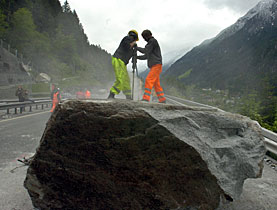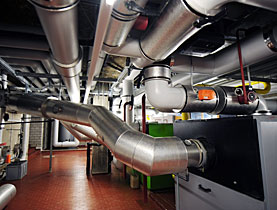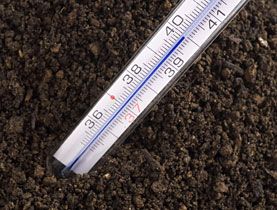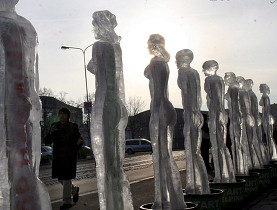Talks aim to improve climate change adaptation

Around 1,500 experts, policymakers and business leaders are meeting in Geneva this week to seek to improve the way climate information is collected and shared.
Switzerland, which has a long tradition of research and adjusting to climate change, backs the creation of a global system to ensure decision-makers obtain accurate and timely climate information and predictions.
The third World Climate Conference, organized by the World Meteorological Organization (WMO), together with Switzerland, runs from Monday until Friday September 4.
The Geneva meeting will decide measures that “will go beyond” the United Nations World Climate Conference in December in Copenhagen, WMO Director-General Michel Jarraud told journalists last week.
In the Danish capital governments will be agreeing on reductions of carbon dioxide, while in Geneva they will be aiming to limit the economic and human risks linked to climate change, he explained.
“I still hope that a substantial agreement can be reached in Copenhagen despite the extremely tough negotiations ahead. But whether or not we manage to limit global warming to two degrees Celsius this century, we have to take adaptation measures,” said Jarraud.
Traditional knowledge
Research into climate change has come on leaps and bounds over recent years, but there are still many weaknesses and unknowns. One billion dollars a year is still needed to complete local climate monitoring networks, as in Africa, said the WMO chief.
While policymakers think on a five-to-ten year scale, many climate researchers make forecasts using a 50-to-100-year range.
“We have to reconcile these two timeframes,” he said. “Even though the problems of global warming are better understood, observations are not used in the best possible way,” he added.
“The past is no longer a good indicator of the future,” said Jarraud, describing climate modelling and prediction as key to fisheries, forestry, transport and tourism, as well as efforts to fight diseases such as malaria.
Knowledge passed down through generations in the farming industry about how to prepare and manage crops was becoming less relevant because of changing patterns of heat, humidity and water access around the world, he said.
Swiss consequences
Switzerland, like many densely populated industrialised countries, is vulnerable to the consequences of climate change, Andreas Götz, deputy director of the Federal Environment Office, told journalists on Thursday.
“Just think about the melting glaciers and the creation of glacial lakes, which can result in devastating floods,” he said.
And the same goes for forests. With an average three degree Celsius increase, the Swiss landscape will change dramatically, with oak trees dominating other species.
“This is important as 50 per cent of Swiss forests have a protective function against rock falls,” he explained.
In the future Switzerland will have to deal with more floods, intense precipitation and landslides, melting permafrost reducing the stability of mountains, and summer droughts influencing forests, agriculture and river and lake navigation.
As a result, monitoring climate change is very important and additional instruments, like surveillance systems for permafrost and rock falls, as well as hazard flood maps, are needed, said Götz.
Not an island
But Switzerland is not an island and in this respect it supports efforts at the international and national levels to adapt to climate change.
“This is not just a conference for scientists and meteorologists,” said José Romero, a top Swiss environmental official.
The Geneva meeting is intended to bridge the gap between those who possess vital climate information and the users and decision-makers in sectors like forestry, energy, health, risk management, food production and water around the world.
In the medium term Switzerland would like to see the creation of a worldwide network, the so-called Global Framework for Climate Services, to address the needs of decision-makers worldwide to obtain accurate and timely climate information and predictions.
“The timing of the Geneva conference, only three months before Copenhagen, is also not a coincidence,” said Romero.
Climate change adaptation played a key role in the 2007 Bali climate discussions and the Geneva meeting aims to provide important technical tools for negotiations in Copenhagen, he added.
Simon Bradley, swissinfo.ch and agencies
This week the Swiss government announced plans to reduce carbon dioxide emissions by at least 20 per cent by 2020 in line with the European Union.
Under the proposals a CO2 levy on heating oil will be extended beyond 2012 and the government is reserving the right to impose a tax on petrol and diesel.
At least 25 per cent of fossil fuel emissions have to be compensated by measures in Switzerland or abroad. Binding emission targets are foreseen for new cars.
But the government wants to abolish the climate centime – a voluntary levy by the industry on greenhouse gases emissions.
The Geneva conference is being attended by Swiss President Hans-Rudolf Merz, who will open the conference on August 31, Swiss Environment Minister Moritz Leuenberger, UN Secretary-General Ban Ki-moon and 80 ministers and 20 heads of state or government, mainly from the developing world.
Kyoto, a 178-nation accord, is a 1997 annex to the 1992 UN climate treaty that requires 37 industrial nations to reduce greenhouse gas emissions by an average of 5% below 1990 levels by 2010.
The Swiss parliament ratified the Kyoto Protocol on climate change in 2003. Switzerland undertook to reduce its CO2 emissions to 10% less than 1990 levels by 2010.
Despite ambitious emission targets, greenhouse gas emissions have actually risen by 0.4% in Switzerland since 1990.
A CO2 law came into force in 2000 to ensure that the Kyoto target was achieved. About a thousand enterprises have taken voluntary measures to reduce their emissions.
But it became clear by 2005 that these measures were not sufficient. It is proving difficult, however, to agree on how to strengthen them.

In compliance with the JTI standards
More: SWI swissinfo.ch certified by the Journalism Trust Initiative




You can find an overview of ongoing debates with our journalists here. Please join us!
If you want to start a conversation about a topic raised in this article or want to report factual errors, email us at english@swissinfo.ch.